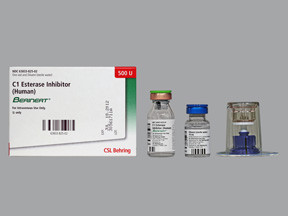C1-ESTERASE INHIBITOR (TREATMENT) - INJECTION
PHONETIC PRONUNCIATION:
COMMON BRAND NAME(S): Berinert
GENERIC NAME(S): C1 esterase inhibitor
Uses
USES: This medication is used to treat the swelling problems that occur with a certain immune disease passed down through families (hereditary angioedema-HAE). HAE is caused by low levels or improper function of a natural substance produced by the body (C1-inhibitor). Symptoms such as rapid swelling of the hands, feet, limbs, face, tongue, or throat can occur. Swelling of the intestinal tract may cause symptoms such as abdominal cramps, diarrhea, or vomiting. Attacks of swelling may occur without reason. However, anxiety, stress, sickness, and surgery may trigger attacks in some people. This medication increases the level of C1-inhibitor to help treat attacks of sudden swelling due to hereditary angioedema.
How to use C1-ESTERASE INHIBITOR (TREATMENT) - INJECTION
HOW TO USE: Read the Patient Information Leaflet if available from your pharmacist before you start using C1-esterase inhibitor and each time you get a refill. If you have any questions, ask your doctor or pharmacist. This medication is given by injection into a vein, at the first signs of an HAE attack, as directed by your doctor. The dosage is based on weight and your medical condition. If you are using this medication at home, learn all preparation and usage instructions from your health care professional. The solution is normally clear and colorless. Before using, check this product visually for particles or discoloration. If either is present, do not use the liquid. Learn how to store and discard medical supplies safely. After giving yourself a dose of this medication, you should get medical help right away for follow-up treatment. Tell your doctor if your condition does not improve or if it worsens.
Side Effects
Precautions
Interactions
Overdose
Images
Reviews
Faq for C1-ESTERASE INHIBITOR (TREATMENT) - INJECTION
C1-esterase inhibitor injection is a medication used to treat hereditary angioedema (HAE). HAE is a genetic condition that causes swelling in various body parts like the hands, feet, face, or airways. This injection helps prevent and manage these swelling episodes.
C1-esterase inhibitor injection works by replacing or increasing the levels of C1-esterase inhibitor in the body. C1-esterase inhibitor is a protein that regulates certain enzymes involved in the immune response. By restoring the normal levels of this protein, the injection helps reduce the frequency and severity of angioedema attacks.
C1-esterase inhibitor injection is administered through a needle into a vein (intravenous injection). It is usually given by a healthcare professional in a hospital or clinic setting.
Common side effects of C1-esterase inhibitor injection may include headache, nausea, diarrhea, fever, dizziness, and injection site reactions. These side effects are generally mild and temporary.
The frequency of C1-esterase inhibitor injections may vary depending on the individual's needs and the severity of their condition. The injections can be given for acute attacks or for prophylactic (preventive) treatment. Your healthcare provider will determine the appropriate dosage and schedule for you.
Yes, some patients may be trained to self-administer C1-esterase inhibitor injection. However, this usually requires proper training and guidance from a healthcare professional.
It is important to discuss the use of C1-esterase inhibitor injection during pregnancy or breastfeeding with your healthcare provider. They can evaluate the potential risks and benefits and determine the best course of action.
If you miss a dose of C1-esterase inhibitor injection, contact your healthcare provider for instructions. It is important to stay on schedule with your treatments to effectively manage your condition.
There are no known significant drug interactions with C1-esterase inhibitor injection. However, it is always advisable to inform your healthcare provider about all the medications you are taking, including prescription, over-the-counter, and herbal products, to ensure safe and effective treatment.
Disclaimer
IMPORTANT: HOW TO USE THIS INFORMATION: This is a summary and does NOT have all possible information about this product. This information does not assure that this product is safe, effective, or appropriate for you. This information is not individual medical advice and does not substitute for the advice of your health care professional. Always ask your health care professional for complete information about this product and your specific health needs.

No Reviews Yet